Skills & Social Activities
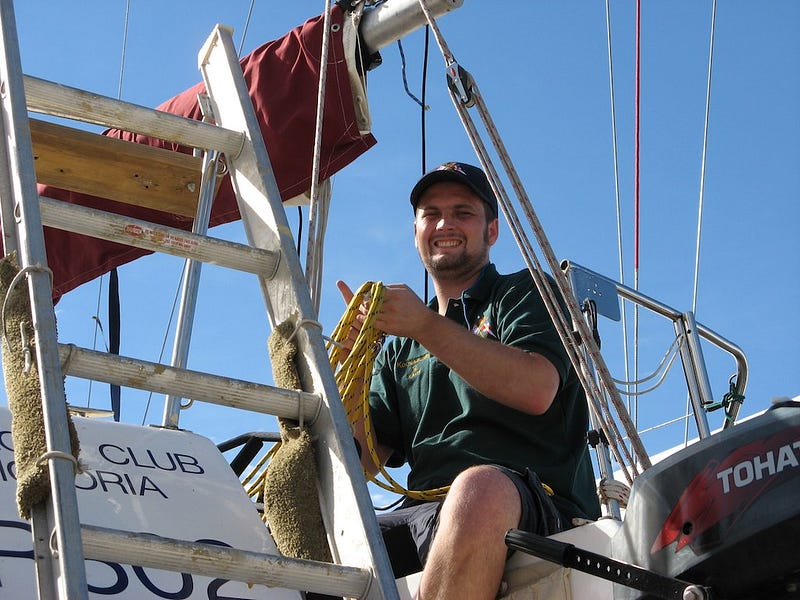
Sailing in Melbourne, was traditionally the ‘thing’ that i most enjoyed as a sporting activity that i was most involved with throughout my (past) life… As was highly influenced due to family heritage….
As is part of life, the means to go out and explore the world, to get involved in social activities; is often curated through clubs.
The knowledge banking frameworks have been designed to support improved means, to forge an internet connected exchange between real-world opportunities and people. Whether it be finding someone who is interested in playing a game of tennis, or one-on-one basketball; or the ability to go find a sailing boat, to go sail on, the way most do that today — is to get down to the club themselves. Meanwhile, there are members already looking for ‘crew’…

There are an array of relationships between personal attributes, including skills; and the means to discover and engage in activities curated with others.
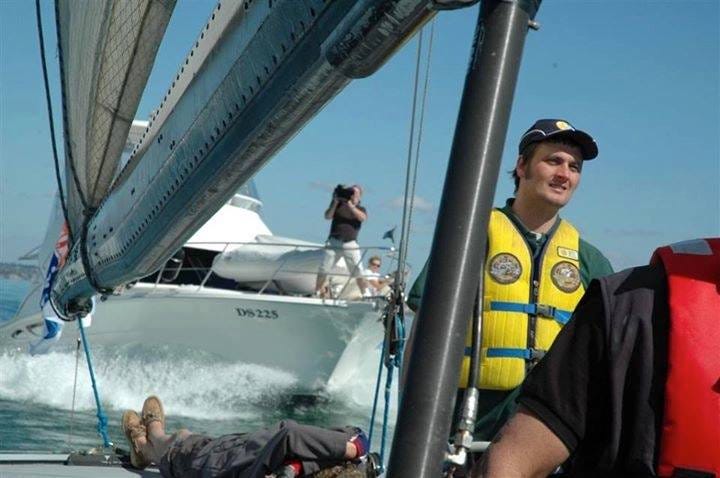
In a similar way to the frameworks described for small businesses; the means for clubs to curate data-services, provides them an ability to extend the reach of their social-networking environment to encourage and support new people, whilst simultaneously supporting broader needs.
For Example; Some forms of sports and activities incorporate considerations for children; where those who are involved in organising events; best be safe, for kids, which does in-turn require an array of assessments from the suitability of adults involved in managing events; through to knowledge about the child, for safety purposes.
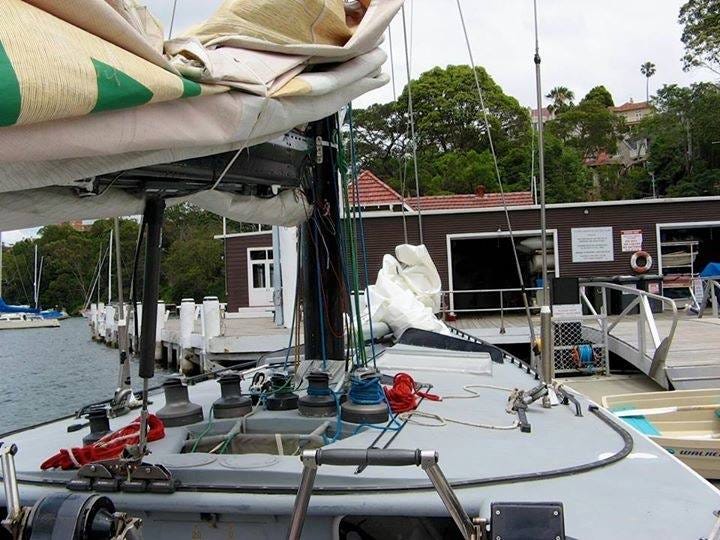
Safely arriving in Sydney, from Melbourne on a 12 metre America’s Cup Boat (with a winged keel)
Some activities, like sailing, incurs safety considerations; and it’s problematic when a newcomer says they have skills and experience, when they don’t. This is particularly important when engaging in dangerous adventures with others..
The means to facilitate opportunities to get involved in all sorts of social activities; requires the means to address factors relating to trust and honesty.
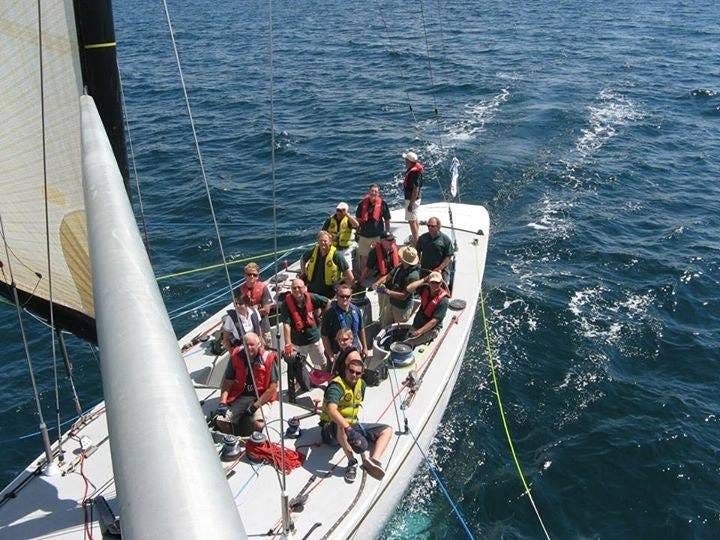
The way this can be brought about, with a knowledge banking industry; means that credentials, or verifiable claims can be articulated overtime, as to provide support for those seeking to engage in new activities, with new people, in relation to the skills they are interested in obtaining, and those they already have.
These skills cross multiple sectors. As such, a ‘working with children check’ & or ‘first aid certificate’; being able to know whether participants know how to swim or have a boating license or sailing insurance; are only some of the sorts of things that are able to be made useful tools, for many purposes.
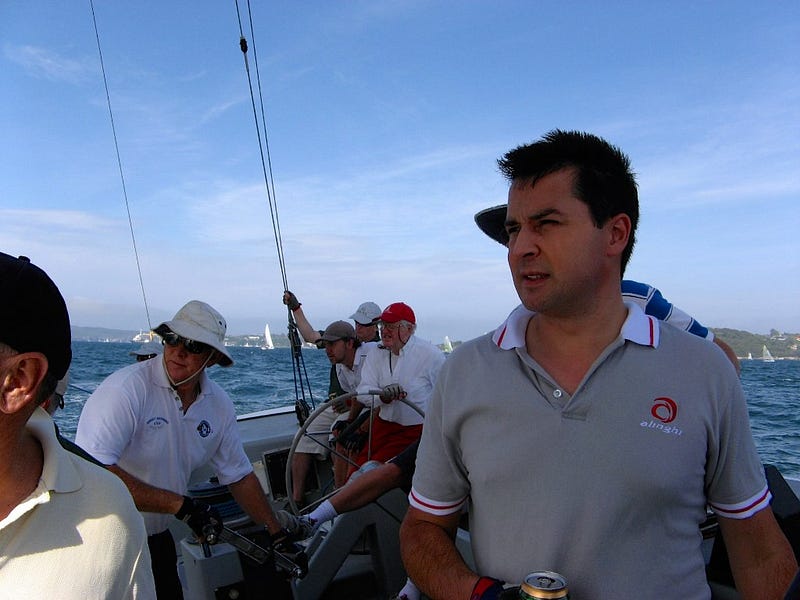
From memory, that’s Sir James Hardy on the Helm of KA11, Kookaburra, with us…
Some skills help to warrant that a person is reasonably able to maintain the safety of themselves and/or others. Yet today, if they claim they’re sufficiently knowledgeable as to know what to do on a sailing yacht, let alone knowing what to do in bad weather and/or off-shore trips; finding out otherwise can be really, very dangerous, for many.
The means to articulate what skills a person has as to proportionately curate opportunities for positive experiences with others, provides an array of opportunities that are otherwise less easily brought about.
I’ve seen Police Sergeants in tears, not knowing what they don’t know. Tough, isn’t a quality that makes knowledge & skills of a task redundant. Indeed, its not only dangerous but moreover foolhardy to allow arrogance to suggest otherwise.
In other cases, the question that spins through the mind of others, is whether it’s worth providing the opportunity, knowing we might need to wash the blood off the deck later on… Running a Spinnaker might look powerful, but only if the person knows how to do it, and why gloves are required on big boats.
There are many good reasons why it is often harder today, than it should be, to get involved with an array of social activities with others; even though, it is often the case that those with greater economic means, make mistakes along the way, and can with great misfortune, contribute to avoidable problems.
To address some of these sorts of issues;
- Clubs often have networked relationships with other clubs that in-turn also supports considerations relating to insurances, for participants.
- Many leagues seek to form teams of people who have complimentary level skills.
But there’s also an array of less organised examples…
- Backpackers and adventurers may be seeking opportunities to go travelling, or go have some sort of activity that is best done with others.
- People and kids might want to get down to a local park and play some sort of game with other kids of their age; parents reasonably desire safety…
All sorts of people have special needs and the means to support social activities, can be improved by providing solutions that help others be attentive.
SOCIETAL CONSIDERATIONS & PHYSICAL & SOCIAL ACTIVITIES
It is relatively easily communicated when a person obtains some sort of achievement from a computer game; or other form of online interaction.
The same is not the case with respect to real-world activities, such as sport.
There is a known health relationship between physical & social activities, and factors relating to health & wellbeing; across all ages of society.
Sometimes the sorts of activities that people can ‘get out of the house and do’ are not about sport, but rather about social wellbeing; volunteering their time to go do something that’s good for others and/or good for the environment.
Each of these sorts of activities form meaningful relationships to the character of a person, the capacities they develop in life, for life; alongside an array of other real-world factors that have material, yet often opaque attributes for AI.
On the upper-side of considerations with respect to the wellbeing of a person who may be considered healthy; there many be many achievements, credentialed attributes that articulate a persons real-world activities in an array of group activities across a spectrum of fields; relating to a happy life.
On the opposing side of a calculation, there is likely to be poor people who do not.
The ‘social networking’ solutions of the world today, do not seemingly provide a great deal of functionality as to articulate the characteristics of a person that have been obtained in an environment where they cannot use social networks.
Whilst this seemingly competitive behaviour, between people going out and doing things that are good for them personally; rather than being consumed in private by online tools that continually seek their attention, online; can be addressed and is part of the R&D undertaken for knowledge banking works…
The means to form legacy credentials
One of the challenges brought about should these sorts of systems be implemented; is how to articulate historical information, in a reliable format.
It is believed that this can be achieved in-part, via social & societal reinforcements. If people have been previously involved in clubs, then there will be membership information that can be used to show that; alongside information that relates their past activities to results (particularly in sports).
Other fields of datasets are less easily obtained. So the opportunity becomes how to instigate the ability to start to bring this about, as to make it an opportunity that’s good for societal ecosystems.
To illustrate one way this might be supported (amongst many) is that many clubs are provided economic support by (local) businesses; in-turn their means to be offered opportunities to sponsor in ways that have data based relationships right through to their businesses offerings, is one way to stimulate new revenue for clubs alongside greater participation with them.
An old example that was made and ‘pitched’ to the local outfit ‘life. be in it’ in 2013–5 is shared below.
There are many factors relating to how these systems in-turn expand far beyond the relatively simple realm of sporting clubs, as to also bring into consideration factors like the means to learn how to play a musical instrument; or how to learn sign language, or many, many other recreational pursuits that have the meaningful outcome of a healthier and happy life.
Should it be the case, that people can afford to do so.
As such, one of the notes worth considering lastly, is that there is a consequence to social-cyber systems that do not promote real-world activities with others in social environments, other than by adrev. generating means.
Today, there are increasingly metrics to identify activities of people in relation to online engagement activities; but not so much offline activities. The implications brought about as a consequence, impact societies in many ways.
Club Management and Credentials
Many clubs have systems for authenticating access to those clubs, which is facilitated both by way of membership cards and related secure access tokens & keys.
The knowledge banking systems, provide an alternative means to support the functional purposes of these membership tools, that otherwise incurs additional costs per customer; and are less flexibly employed overall.
Whether it be providing the means for a fee-paying member to gain access to the club, its car-park or other facilities; or the means to associate the member to a membership benefit that may be available elsewhere because their a member; or the ability to associate a member of one club, who has replicable rights with another club (upon the basis that they’re well-behaved); or the means to ensure clubs, that are required to ‘sign in’ visits can do so easily,
The knowledge banking frameworks support these functional attributes, alongside a great deal more.
It doesn’t matter if its about helping a person ensure they know how much alcohol their consuming before the want to drive home (ie: ability to associate whether the jug of beer is low-strength or full-strength); or the ability to help someone who might have a gambling addition; or the ability to know, whether someone has acted in a manner that has led them to damaging property at one club, seeking trusted access to another.
The means to curate how these sorts of things work, need to be empowered by a system that supports the individuals means to manage their own data; which is achieved through a knowledge banking system, that works with other systems, produced and operated by other groups of humans elsewhere.